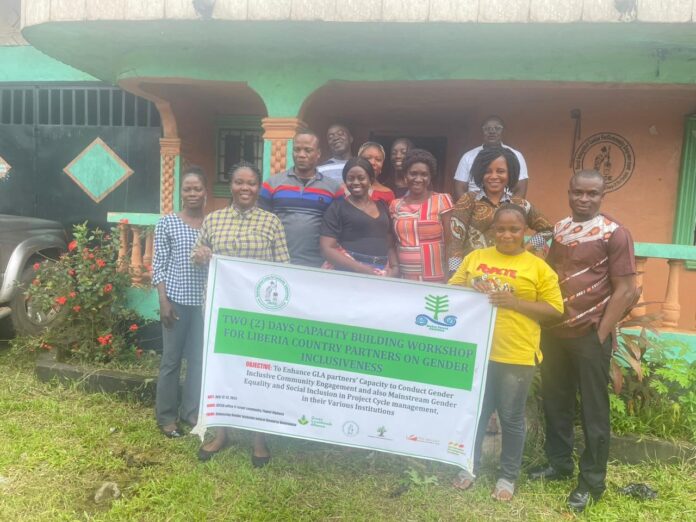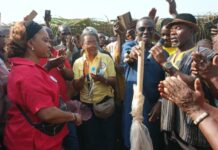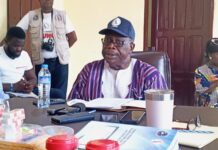In an effort to enhance the capacity of Liberia country partners of the Green Livelihoods Alliance (GLA 2.0) Forest for a Just Future Program, the Rural Integrated Center for Community Empowerment (RICCE) has provided a two-day capacity building workshop on gender inclusiveness.
The overall objective of the two-day intensive training was to strengthen GLA partners’ capacity to conduct gender inclusive community engagements and also mainstream gender equality and social inclusion in project circle management in their various institutions.
It was held under the theme: “Enhancing gender inclusion in natural resource governance.” The training conducted at RICCE Office in Israel Community, Johnsonville Township, outside Monrovia took place from July 12-13, 2023.
Beneficiaries of the training were drawn from GLA Liberia country partners including Sustainable Development Institute (SDI), the Daylight, Community Rights Support Facility (CRSF), Liberia Forest Media Watch (LFMW), Civil Society Oil Palm Working Group and the organizer, Rural Integrated Center for Community Empowerment (RICCE) respectively.
Under the GLA 2.0 Forest for a Just Future Program, RICCE is hired as the Gender Technical Partner by the Global Forest Coalition (GFC), an alliance member of the GLA for gender transformation and inclusion into all GLA programs in Liberia.
Giving an overview of the training, the Program Manager of RICCE, Madam Renee Gibson reminded the participants that RICCE provides technical support to GLA partners to ensure that all of the program implementation is gender inclusive and gender responsive in accordance with GLA mandate.
“In our past program, GLA 2.0, we conducted Gender Audit for GLA partners and as part of the audit, Gender Focal Persons were appointed in all of the GLA institutions and the idea is to ensure that there is gender inclusion and gender sensitive programming in all of GLA programs across the project landscapes,” she said.
Madam Gibson further added “We are working with Gender Focal Persons that are into programming in the communities. We want to strengthen their capacities because those are technical people who already have basic knowledge on gender issues, but part of our role as technical partner is to ensure their capacity is enhanced to implement.
This will allow them to identify all of the different root causes of gender inequalities and be able to address them at the community level. One of the achievements of the Gender Audit is that there were Gender Action Plan developed by each partner as part of the strategy because structures were not in place resulting to low level of female employment and gender inequality in programing. The result also showed that GLA partners were doing well with gender at the community level, but were challenged at their institutions.”
“One of the things done during the training was to review the field manual for land formalization by the Liberia Land Authority (LLA) to guide the process of Customary Land Formalization in Liberia. We reviewed the guidelines and identified some gender gaps and provided mitigation for partners to follow during community engagement on land formalization.
Renee N. Gibson, Program Manager of RICCE further said “One of the issues we captured in our MTR is the issue of limited or lack of literacy programs for women and girls in the project landscape to enhance their capacity to actively participate in discussions around natural resource management and governance in Liberia. Yes, women are included into forest governance in Liberia, but are they empowered to discuss the issues or lead the discussions? We don’t want women to be elected as members of the various governing bodies (CLDMC, CFMB, CA, CFDC etc) just to sit there and allow the men to make all the decisions, but we want them to meaningfully contribute to decision making processes.” RICCE will continue mentorship to partners and monitor the application of the gender responsiveness and justice in program implementation within GLA project landscape,” she added.
Topics covered during the training include Basic Human Rights principles, Laws and policies, international and domestic; the Universal Declaration on Human Rights (UDHR), Liberia Constitution and Convention on the Eliminations of all forms of Discrimination Against Women (CEDAW).
Others include Understanding Gender, gender equality, gender roles, and how gender inequality undermines decision and outcomes. Intersectionality and its root causes, review of the Liberia Land Authority field manual for land formalization, gender sensitive information sharing, gender transformation and approaches, gender mainstreaming and action plans for gender responsive approaches among others.
Speaking at the close of the training, the participants, predominantly females commended RICCE for providing them with what they called ‘insightful training’ at the right time for them. According to the excited participants, the training has further enhanced their push for gender responsive, inclusive and transformative programming at their institutional and community levels.
At the end of the training, the participants who are Gender Focus Persons at their respective institutions vowed to use what they have acquired from RICCE and partners to make amendments to their various projects, approaches and languages moving forward. They were also drilled on how to use local and international legal instruments in their advocacy or campaigns.
Funding for the training was provided by the Global Forest Coalition (GFC), an alliance member of the Green Livelihoods Alliance (GLA 2.0) Forest for a Just Future Program (FfJF).
























